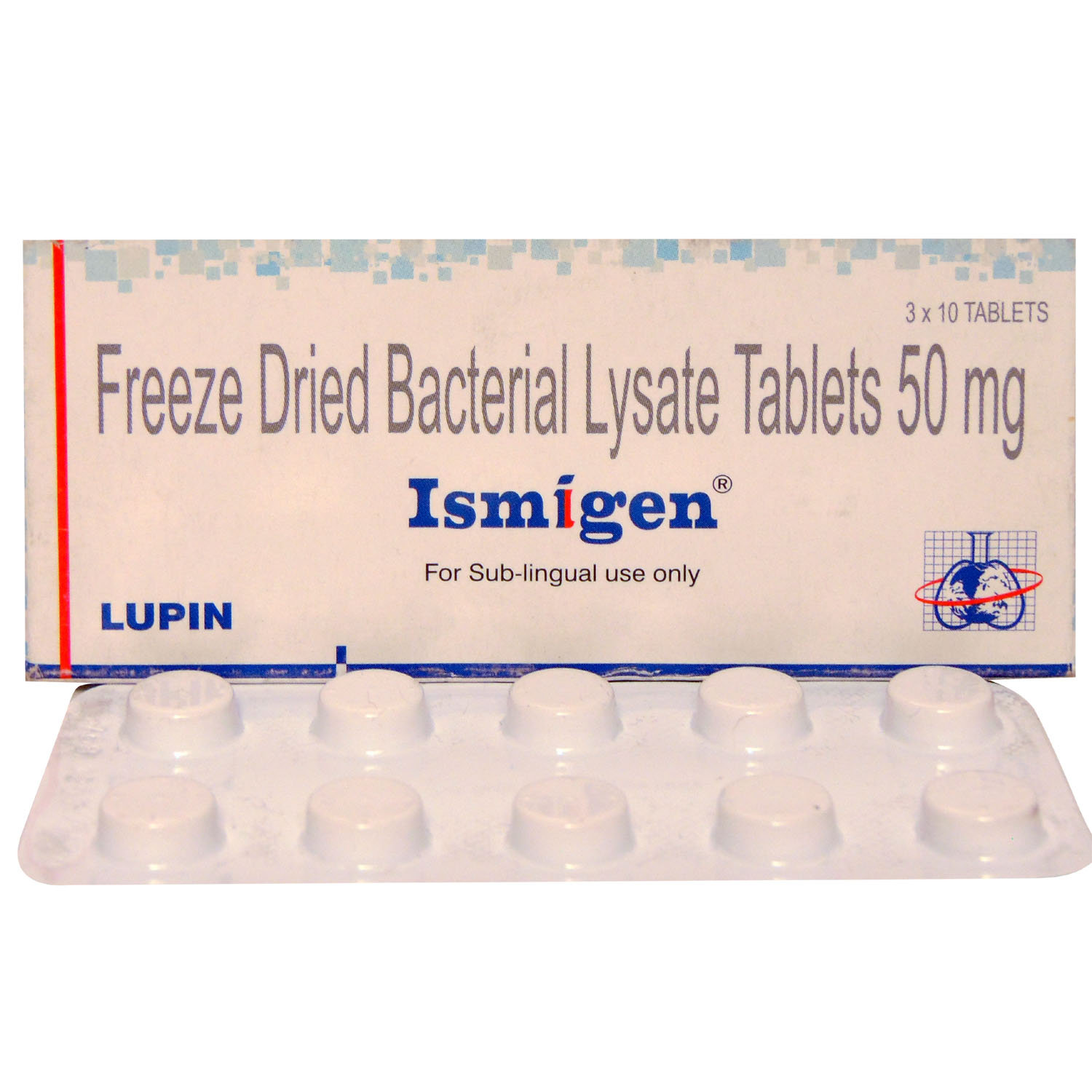Bacterial Lysate
About Bacterial Lysate
Bacterial Lysate belongs to the class of medications known as immunostimulants indicated for acute, sub-acute, chronic or recurrent infections of the upper and lower respiratory tract. It is also used to prevent and reduce the intensity of relapses. Respiratory tract infections are infections of the body's respiratory tract, which includes the sinuses, throat, airways, and lungs.
Bacterial Lysate is the active component in Bacterial Lysate. It works by regulating the immune system to activate a protective response against viruses or bacteria that cause recurring airway infections. It also boosts the immune system against certain diseases.
Take Bacterial Lysate as prescribed. Depending on your medical condition, you should take Bacterial Lysate for as long as your doctor has prescribed it for you. Typically, no common side effects were observed with Bacterial Lysate. However, in very rare cases, it may cause gastrointestinal disorders. If you experience any side effects during the treatment, please report to your healthcare professional for further advice.
Inform your doctor if you are known to be allergic to any of the components of Bacterial Lysate. Bacterial Lysate is not recommended for use in children below three years. Bacterial Lysate should be used in pregnant/nursing women only if clinically needed, and benefits outweigh the risks. It is unknown whether it is safe to consume alcohol with Bacterial Lysate. However, it is advisable not to take or limit alcohol as a precautionary measure.
Uses of Bacterial Lysate
Medicinal Benefits
Bacterial Lysate belongs to a class of immunostimulant medications indicated for acute, sub-acute, chronic or recurrent infections of the upper and lower respiratory tract. It is also used to prevent and reduce the intensity of relapses. Bacterial Lysate works by regulating the immune system to activate a protective response against viruses or bacteria that cause recurrent airway infections. It also enhancements immunity against certain diseases as well.
Directions for Use
Storage
Side Effects of Bacterial Lysate
- Gastrointestinal disorders
Drug Warnings
Please do not take Bacterial Lysate if you are allergic to any of the ingredients. Before taking this medicine, let your doctor know if you have kidney or liver disease. It is not recommended to use Bacterial Lysate during the first three months of a confirmed or suspected pregnancy. Consult your doctor before taking Bacterial Lysate if you are a lactating mother. Bacterial Lysate is not suitable for children below three years. Consumption of alcohol along with Bacterial Lysate is not advisable as it may cause unpleasant side effects.
Drug Interactions
Drug-Drug Interactions: No interactions were found/established.
Drug-Food Interactions: Limit or avoid the consumption of alcohol.
Drug-Disease Interactions: No interactions were found/established.
Drug-Drug Interactions Checker List:
Safety Advice

Alcohol
cautionIt is unclear whether drinking alcohol along with Bacterial Lysate is safe or not. However, it is suggested to avoid or limit alcohol consumption as a preventative step.

Pregnancy
cautionAlthough no toxic effects have been observed in animal studies, it is not recommended to use Bacterial Lysate during the first three months of a confirmed or suspected pregnancy. For more information, please seek medical advice.

Breast Feeding
cautionThere is no substantial research yet on the use of Bacterial Lysate in breastfeeding/nursing mothers. Your doctor will weigh the benefits and potential risks before prescribing Bacterial Lysate to you. Please consult your doctor.

Driving
cautionThere has been no reported impact on driving. However, drive only if you are physically stable and mentally focused. If you feel drowsy after taking this medicine, you should not drive or operate any machinery or vehicles.

Liver
cautionThere is limited information on the use of Bacterial Lysate in patients with liver disease. Your doctor will weigh the benefits and any potential risks before prescribing Bacterial Lysate. Please consult your doctor.

Kidney
cautionThere is limited information on the use of Bacterial Lysate in patients with kidney disease. Your doctor will weigh the benefits and potential risks before prescribing Bacterial Lysate. Please consult your doctor.

Children
cautionBacterial Lysate is not recommended for use in children below 3 years.
Habit Forming
Diet & Lifestyle Advise
- To relieve cough, consume lemon and honey beverage (not suitable for babies under 1-year-old)
- If you have a sore throat, gargle with lukewarm salt water (children should not try this)
- Get a lot of rest.
- Raise your head with extra pillows while sleeping to improve your breathing.
- Cover your mouth and wash your hands frequently when you cough or sneeze.
- Do not smoke as it may worsen breathing problems.
Patients Concern
Disease/Condition Glossary
Respiratory tract infections (RTIs): Any infectious condition of the upper or lower respiratory tract is a respiratory tract infection. The common cold, sinusitis (sinus infection), tonsillitis, and laryngitis are upper respiratory tract infections. Bronchitis, bronchiolitis, chest infection, and pneumonia are examples of lower respiratory tract infections (lung infections). Flu can be classified as an upper or lower respiratory tract infection. Lower respiratory tract infections tend to be more severe and stay longer.
FAQs
Bacterial Lysate works by regulating the immune system in order to activate a protective response against bacteria or viruses that cause recurring airway infections. It successfully strengthens the immune system in case of various infections.
No, it is a medication recommended by a doctor to treat or prevent specific medical conditions. Taking it on your own can result in unfavourable side effects.
There have been no particular studies on the impact of Bacterial Lysate on fertility. If you have any concerns about this, do not hesitate to get in touch with a healthcare professional.
Your symptoms may improve even though your condition has not resolved properly. However, even if you feel better, it is recommended that you complete the entire course of treatment as prescribed by the healthcare professional.




